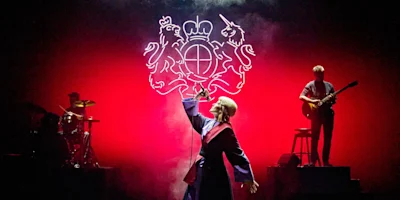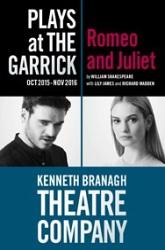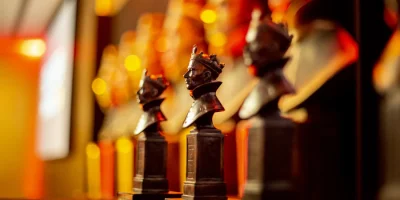
Romeo and Juliet - a History of Stars on Stage
As one of Shakespeare's most popular and in many ways most accessible plays, Romeo and Juliet's tragic love story between two 'star-crossed lovers' from the opposing houses of Montague and Capulet continues to resonate with audiences around the world. Thanks to a number of high profile adaptations that span multiple forms from opera, to ballet and musical theatre, audiences often access the play initially through an alternative interpretation. Shakespeare's text however remains as one of his most frequently performed works, and once again is preparing to take the West End by storm.
The Kenneth Branagh Theatre Company continue their residency at the Garrick Theatre with an all new production of the classic tragedy, directed by Kenneth Branagh and Rob Ashford. In context with the rest of the season, which has already included a Shakespeare production by the way of his late problem play The Winter's Tale, the show is the first of the season to not star Branagh in any of the roles.
Instead the acclaimed actor and director reunites the stars of his live action version of 'Cinderella', Richard Madden and Lily James, alongside a supporting cast of West End favourites including Derek Jacobi (Mercutio) and Meera Syal (Nurse).
Lily James achieved international prominence thanks to ITV's hit period drama 'Downton Abbey', in which she played the role of Lady Rose. Since graduating from drama school in 2012, her stage credits have included 'Othello' at the Sheffield Crucible, 'The Seagull' at the Southwark Playhouse and 'Vernon God Little' at the Young Vic. She was recently seen on screen in the new TV adaptation of 'War and Peace', as well as the film version of 'Pride and Prejudice and Zombies'. Reuniting with her Cinderella co-star and 'Game of Thrones' actor Richard Maddon, the pair join a long line of famous Romeos and Juliets that have graced London stages over the decades.
Whilst for many audiences the most familiar pairing came from Baz Luhrmann's 1996 film adaptation that starred Leonardo DiCaprio and Claire Danes, London audiences have a long history of seeing famous faces in the two roles. Usually played in their early 20s (Juliet is written as being 14 in Shakespeare's text), the roles have often been taken by younger members of companies who have later gone on to be well known acting greats. Below is a small selection of familiar names who have taken on the roles over the decades.
This production ran at the New Theatre (now the Noel Coward) where it was directed by John Gielgud, who alternated in the role of Romeo and Mercutio alongside the 28 year old Olivier. The production was remarkable due to its attempt at bringing historical realism to Shakespeare in the West End, and used a combination of texts from both Quartos to present a very literal production. Due to the alternating roles, the production was a hit at the box office with repeat audiences eager to see the differences in both Olivier and Gielgud's performances. Olivier himself described the two takes on Romeo, stating that John's performance was "all spiritual, all spirituality, all beauty, all abstract things; and myself as all earth, blood, humanity..."
Opening at the Old Vic Theatre, Franco Zeffirelli's production served as a basis for his later 1968 film version that is one of the most acclaimed screen adaptations of Shakespeare's work. Finding contemporary relevance in the text, Zeffierelli cut down the play by around one-third, and cast the more youthful John Stride and 26 year old Judi Dench in the lead roles. The production was well received, and formed the basis for the 1968 film which starred 17 year old Leonard Whiting and 15 year old Olivia Hussey, alongside Laurence Olivier who spoke the play's famous prologue.
Terry Hands directed a production of the play for the RSC starring RADA graduate Estelle Kohler and 'James Bond' star Timothy Dalton. Despite being well before his days as 007, Dalton had made a name for himself on stage, as well as in film adaptations such as 'The Lion in Winter' and 'Wuthering Heights'. He took a break in 1971 to concentrate on the theatre, and joined the RSC where he starred in this "bitter and dark" reading of the play.
Sir Ian McKellen first starred in Romeo and Juliet in this new production for the RSC directed by Trevor Nunn. The venue was reformed as an Elizabethan playhouse with audience sitting behind the stage, providing an authentic feel. Roger Rees co-starred as Benvolio, alongside Richard Griffiths as Peter, and the production later played at the Theatre Royal in Newcastle before transferring to the West End's Aldwych Theatre for a summer season in 1977.
This modern-dress production starred Sean Bean and Niamh Cusack at the RSC, directed by Michael Bogdanov. The production was seen as being bleak and cynical, setting the lovers against a materialistic and hypocritical modern society. Liberties were taken with the text, replacing Juliet's suicide with the Prologue, spoken by the Prince in front of journalists and photographers. The production was full of modern references of 80s excess, including Armani suits, leather jackets and a red sports car, and ended with Bean's Romeo poisoning himself with a drug from a hypodermic needle.
Terry Hands returned to the play in the late 80s at the RSC in the more intimate Swan Theatre. Oscar, Tony and Olivier Award-winner Rylance played opposite Slowe in a careful and moderate production that pitched the two contrasting actors together to offer a different exploration of the central couple. The production was simple in design and allowed the text to breath and move swiftly between each scene.
The National Theatre presented a production of the play in the Olivier Theatre directed by Tim Supple, featuring design by Robert Innes Hopkins. The production was called a "a muddled, mediocre affair characterised by poor verse-speaking" by Michael Billington in The Guardian, and attempted to present a modern reading of the play, including racial tensions, Latin music and Irish accents to give the play a new lease of life. Despite the negative reviews, the Oscar-nominated 'Twelve Years a Slave' star Ejiofor was met with good notices: "The one actor with the requisite fire is Chiwetel Ejiofor, whose fine Romeo progresses from moping courtly lover to someone spurred by untrammelled sexual desire." (Guardian).
A new celebrity led Broadway production opened in New York in 2013 at the Richard Rodgers Theatre, but only managed to run for 93 performances despite the star names attached. The first Broadway production of the play since 1977 featured white Montague's against black Capulets, and director David Leveaux ensured Bloom made an impact by having him arrive on a motorbike. Whilst the production was praised for bringing a new audience to Broadway, it wasn't met with kind words from the press: "it never acquires the fiery, all-consuming urgency that "Romeo and Juliet" should deliver" (NY Times); "the dreamy intoxication that such a heady fragrance might transmit is largely missing from David Leveaux's snoozy modern-dress production, along with poetry and heat." (Hollywood Reporter).
Originally published on









